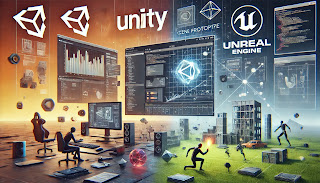Game prototyping is a critical phase in game development, allowing developers to test
concepts, mechanics, and designs before committing to full-scale production. Unity and
Unreal Engine, two of the most prominent game engines in the industry, have emerged
as invaluable tools for rapid game prototyping. Their extensive features, intuitive tools,
and community support make them ideal for developers to bring their ideas to life quickly
and efficiently.
In this article, we explore how Unity and Unreal Engines streamline the game prototyping
process and why partnering with an experienced Unreal game development company
or a provider of Unity Game development services can be the key to achieving your
game development goals.
1. Unity’s Approach to Rapid Game Prototyping
Unity has long been recognized for its user-friendly interface and versatility, making it
a go-to engine for prototyping games. Here are the key ways Unity accelerates game
prototyping:
a) Intuitive Asset Pipeline
Unity’s asset pipeline supports a wide range of formats, allowing developers to import 2D
and 3D assets seamlessly. This means game prototypes can include visuals that closely
resemble the final product, helping stakeholders visualize the concept more effectively.
b) Asset Store Integration
Unity’s Asset Store offers thousands of pre-made assets, including character models,
animations, and environment props. Developers can leverage these assets to quickly
populate their prototypes without investing time in creating everything from scratch.
c) C# Scripting for Flexibility
Unity’s scripting language, C#, is known for its ease of use and flexibility. Developers
can implement and iterate on game mechanics rapidly, enabling quick testing and
refinement of ideas.
d) Multi-Platform Testing
Unity’s ability to build for multiple platforms with minimal adjustments allows developers
to prototype for mobile, PC, or console simultaneously. This is especially beneficial for
cross-platform game ideas.
2. Unreal Engine’s Contribution to Prototyping Efficiency
Unreal Engine is renowned for its high-fidelity visuals and robust toolset, making it another
strong contender for game prototyping. Here’s how Unreal Engine enhances the
prototyping process:
a) Blueprint Visual Scripting
Unreal’s Blueprint system allows developers to create complex gameplay mechanics
without writing a single line of code. This feature is particularly useful for rapid prototyping,
as it reduces the time required to implement and iterate on ideas.
b) Photorealistic Rendering
Even at the prototyping stage, Unreal Engine’s advanced rendering capabilities enable
developers to showcase stunning visuals. This is ideal for pitching concepts to investors
or publishers who value visual impact.
c) Pre-Built Templates and Tools
Unreal Engine comes with pre-built templates for different game genres, such as first-
person shooters or platformers. These templates serve as a starting point, significantly
reducing development time during the prototyping phase.
d) Extensive Asset Library
Like Unity, Unreal Engine provides access to a rich library of free and premium assets
through its Marketplace. These assets allow developers to quickly build detailed and
immersive prototypes.
3. The Role of Expertise in Game Prototyping
While Unity and Unreal provide incredible tools for rapid prototyping, the expertise of the
development team plays a crucial role in maximizing these engines' potential. Working
with a professional Unreal game development company or a provider of Unity Game
development services ensures that the prototyping process is efficient and aligned
with the project’s goals.
4. Key Benefits of Using Unity and Unreal for Prototyping
a) Cost Efficiency
Both engines provide free versions that cater to indie developers and small studios,
reducing the upfront investment needed to start prototyping.
b) Community and Support
Unity and Unreal have large, active communities. Developers can find tutorials, forums,
and plugins to solve any challenges they encounter during prototyping.
c) Scalability
Prototypes built in Unity or Unreal can easily transition to full production, saving time and
effort when scaling up the project.
d) Rapid Iteration
Both engines support rapid iteration, enabling developers to tweak and test game mechanics
quickly. This agility is critical during the prototyping phase, where ideas evolve frequently.
5. Conclusion
Unity and Unreal Engine are powerful allies for game developers looking to prototype their
ideas efficiently. Unity’s intuitive interface and robust asset store make it ideal for quick
and versatile prototyping, while Unreal Engine’s Blueprint system and photorealistic
rendering capabilities are perfect for showcasing high-fidelity concepts.
To make the most of these engines, consider collaborating with a specialized Unreal
game development company or a team offering Unity Game development services.
Their expertise can turn your game concept into a polished prototype, setting the
foundation for a successful game development journey.

.jpg)

.jpg)
No comments:
Post a Comment